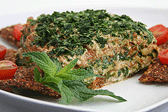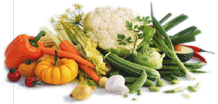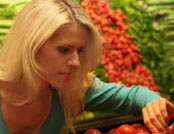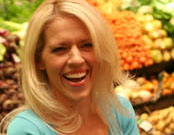Details & Benefits of a High Raw Diet
Phytonutrients, Vitamins & Minerals
Phytonutrients ("phyto" means "plant"), which includes antioxidants, give fruits and vegetables their radiant colors and are important in the prevention of chronic diseases, most notably cancer. These are literally nature's compounds that keep us well. Doctors Hyman and Galland say that phytonutrients help "turn-on" your body's metabolism at the cellular level and regulate hormones that help control appetite. These foods have high levels of antioxidants with health promoting and disease preventing compounds.
Most vitamins and phytonutrients are destroyed or damaged when cooked or processed above 130 degrees so they're less available for assimilation. In short, when you cook your food, you're destroying the nutrients. It's like eating empty foods, or empty calories, that just fill you up temporarily. What's the point? It's a waste and you'll end up not feeling satiated because there are not any nutrients, and your body needs nutrients. Eating fresh, organic Raw fruits and vegetables will increase the vitamins and micronutrients in your diet and you'll feel the difference immediately. What's more is that, once I started making it a point to eat all of the food I prepared at home, organic, it was shocking to me how untasty food became for me at restaurants. When I would go out and order a salad, it literally tasted like chemicals, or plastic, and was no longer a tomato or cucumber. No wonder people aren't excited about eating raw fruits and vegetables. It's because, unless you're eating organic, it doesn't taste very good.
I love making a salad with all the different colors because it's so pleasing to the eye. They say in real estate, "location, location, location." My family owns a restaurant in Michigan and with food, it's all about "presentation, presentation, presentation"! Adding color through Raw foods is both healthy and beautiful, and it's one of the easiest things you can do for yourself. (I teach much more about this in my classes and consulting.) The way you plate your food is a key component to being satisfied. And, when you have these beautiful colors available in fresh fruits and vegetables, it's so simple. You're whole family will be excited to sit down at the dinner table to see what palate of colors you've created each time.
Enzymes
Enzymes are the power of life. They are living forces that conduct and direct every activity in your body. Enzymes "digest" or break down raw foods. More and more research suggests eating high-enzyme food helps digestion. Eating an enzyme-rich diet is thought to increase vitality and slow the aging process. According to Dr. Gabriel Cousens, M.D., "Enzymes can even help repair our DNA and RNA." One of the keys for easy weight loss is through the action of enzymes. For example, lipase, a fat splitting enzyme, is found in Raw foods. Lipase helps your body in digestion and fat burning for energy. Protease is another enzyme for keeping a healthy body. Proteases split up proteins into their component amino acid building blocks and help eliminate toxins.
Enzymes are heat sensitive and destroyed at temperatures above 118 degrees. Again, the bottom line here is that when you cook your food, you're destroying the nutrients and enzymes. It's like eating empty foods that just fill you up temporarily. And, you're causing your body to do more work than necessary to digest the cooked food you just ate. It's not only a waste, but it also accelerates aging. One of the reasons your energy skyrockets when you eat Raw foods is that your body doesn't spend as much time digesting the food. Digestion is the #1 energy drainer for people, so if you can help that by decreasing the time your body needs to digest food, you'll automatically experience more pure, real energy.
Proteins
Here's a fun and important topic. I'm always asked, "Where do you get your protein?"
Answer: The same place elephants, bulls, and buffalos get their protein — from eating plants. See, we have been misguided and programmed to believe that the only source of protein is from meat — aka, animal tissue. But in reality, plant-based foods contain plenty of extremely high-quality protein that is actually easier for your body to digest and assimilate. The reason they are higher quality is simple: Plant proteins are found inside plant cells, the walls of which are made of the rigid material we call fiber. Fiber passes through our system in a nice, orderly fashion, giving us healthy, regular bowel movements. In contrast, animal proteins are inside of animal cells, the walls of which are made of cholesterol, which our bodies aren't well-equipped to break down. It coats our gut with grease, making absorption difficult. It constipates us. And when absorbed into our blood, cholesterol makes our blood thick, clogs our arteries, and kills more Americans than anything else. By eating a variety of plants in your diet, including plenty of greens, it is very easy to get 100% "complete" protein, meaning all 8 essential amino acids are present in abundance.
Furthermore, heat damages proteins, causing the amino acid chains to congeal. Damaged protein is for the most part unusable and can be harmful to your body, causing inflammation and other problems. When food is cooked above 118 F, essential nutrients like vitamins, minerals and enzymes are lost. Amino acids, the building blocks of protein, begin to deteriorate at that temperature and are completely destroyed at 160 F. Too much protein in your body actually causes harm, but you almost never hear about that. It harms your digestive tract, your kidneys and much more by making your system too acidic. For those of you who think eating a high protein diet aids in weight loss, take note: The American Cancer Society conducted a study over a 10-year period with nearly 80,000 people trying to lose weight. Participants who ate meat three times a week or more gained substantially more weight than those who avoided meat and consumed more vegetables. And studies published in the Journal of Clinical Nutrition and the New England Journal of Medicine found that meat-eaters are much more likely to be overweight than vegetarians. Not to mention much less healthy.
When I was a competitive bodybuilder it seemed that all I ate was meat. A month before competition, it wasn't surprising to find me throwing down two slabs of ribs in one sitting. Yes, two slabs of ribs! Or, having plain broiled fish or chicken for lunch and dinner. When it was time for snacking, I'd grab a plain chicken breast or a can of tuna fish. Sure, I was getting skinny on my diet, but there were other disturbing things going on with my body. I was in a mental fog all the time. I felt heavy, even though I was in what I thought had to be the best shape of my life. I broke out with acne frequently, especially my face and back. And the headaches, oh how I suffered from headaches. So I always wondered, what the heck? I'm following my trainer's guidelines and I'm seeing some improvements, like weight loss, but there were all of these other symptoms, signs that something is wrong, that were prohibiting me from experiencing true optimal health. The protein was taking its toll on my body.
It's important to be aware of the dangers when eating a high protein diet. The weight loss that occurs on these diets is caused by bodily distress, not healthy living. Protein derived from animal sources is very acidic to the human body and it causes acids to rise in the blood stream. It's been shown over and over again that excess proteins and acids stress kidneys, too. High protein and fat consumption can contribute to cancer, heart disease, arthritis, kidney and liver problems, and osteoporosis. (Some people ask about eating raw meat. While it's true the enzymes are intact in raw meat, it introduces a whole host of other issues, most notably, parasite susceptibility. This includes raw fish. Fish is also especially dangerous because so many of the heavy metals that we pollute the ocean with end up in fish flesh, making it very toxic.)
But now the great news! Protein can be found in all natural foods ("natural" as in unrefined). Vegetables and fruits have protein. Nuts, seeds (especially hemp seeds), algae, as well as higher protein greens and sprouts, which have up to 50% of their calories from protein, can satisfy even the higher protein demands of pregnant women, athletes, and people trying to gain lean muscle mass.
More protein is assimilated in Raw foods than in cooked foods. Therefore, the consensus of many leading authorities is that it's not the quantity that's important, it's the quality. When you're eating fresh, Raw protein sources, your body is able to assimilate the amino acids much more efficiently because they're not destroyed or denatured by heat. Therefore, you don't need as much. Raw protein is considered to be more digestible by the human body because the amino acids and digestive enzymes are intact; whereas heavily cooked foods are devoid of these enzymes, making them more likely to sit in the colon and increase the risk of disease. It's beneficial to your body to eat foods full of enzymes and phytonutrients for better digestion as well as making your body healthier. You'll see that you don't have to physically recover from your meals anymore when you're eating a diet that is high in Raw food.
The world's longest living cultures, Okinawans and the Hunzas of Pakistan for example (who frequently live to be over 100), consume small amounts of protein, usually making up 20% or less of their diets. Even non-vegetarians should still also add at least 50% Raw foods to their diets. Non-vegetarians often find that they naturally reduce the amount of animal protein they consume once they start eating more Raw foods.
So how much protein does a person need? According to the FDA, it's about 30 grams per day, depending on your weight and activity level, and even that number is extremely padded. Assume 40-70 grams if you're very active (e.g., weight training, a marathon runner, etc). The bottom line is to see what works for you. You'll be amazed at how much more energy you have when you eat a diet high in Raw organic foods such as fresh fruits and vegetables with nuts and seeds, and you're not bogged down because your body is trying to digest all that cooked and denatured protein.
Fats
Raw fats are extremely helpful in transitioning you to a higher Raw diet, away from cooked foods. As long as you are getting enough green vegetables and fruits, and not overeating all the time, you don't have to worry about limiting your intake of the good fats. The "good fats" include mono-unsaturated fats, which you can find in avocados, almonds, and olives, Omega-3 fatty acids, which are in flax seeds and walnuts. The "good fats" also include polyunsaturated fats, which can bind with toxins, helping to eliminate them from your body. So, these are some of the most healing fats for the body. You can find these in walnuts, flax, hemp, sesame, sunflower and other seeds.
Within reason, you will not get fat by eating avocadoes, sprouted nuts and seeds, and other plant fats. Everything in moderation of course, but eating this daily is not an issue for most people with respect to weight. When I first started this diet, I didn't have much weight to lose, but the few extra pounds I had, and my cellulite, started to disappear, because I was eating fats in their whole natural form, with all of their enzymes intact.
The bad fats people usually encounter include trans-fats, saturated animal fat, and refined polyunsaturated fats, such as refined cooking oils. You see, the good, natural fats (think of avocados and olives, for example) are very sensitive to heat and are easily damaged by it. Heated fats lose their antioxidant qualities and are classified as carcinogenic. The interesting thing is that when you process or cook fats, they lose their nutritional value, so when people think they're getting omegas from cooked salmon, they need to think again, because omegas are among the most heat sensitive.
Now, most nuts and seeds, particularly nuts, can be a little acid forming, so eat these in moderation, and combine with plenty of alkalizing greens or vegetables for enhanced nutrition. For increased digestibility and to make them less acidic, soak your nuts and seeds overnight before using them.
Digestion, Assimilation, and Elimination
When I used to sleep at night, I would often wake up in the middle of the night and tear off the sheets and my pajamas because I was sweating so badly. This is commonly referred to as "digestive fire" and was due to poor digestion and improper food combining. It was so uncomfortable. If you don't sleep well, lack energy, or simply feel "off," poor digestion is likely the blame. A well-functioning digestive system can help set you up for top physical and emotional well being. Moreover, good digestion aids in assimilation of nutrients, so your body absorbs all of the vitamins and minerals you're eating.
A well-functioning digestive system also has excellent elimination, so you're having regular bowel movements, which are essential to good health. A good rule of thumb: You should be having approximately the number of bowel movements EACH DAY for the number of meals you eat. So, if you eat 3 meals, you should have 2-3 bowel movements. When you're just starting out with eating more Raw foods, it's not unheard of to go to the bathroom as many as 4-5 times a day as you start to clean out your digestive tract! When people realize they should be having more than ONE bowel movement most days, they're usually shocked. In short, you've probably been constipated, to varying degrees, your whole life. The almost immediate transformation to proper elimination is a very dramatic change that people experience when they go Raw. It leads to an immediate feeling of high-energy, the exact opposite of feeling sluggish or bloated. It's extremely empowering to have such extra energy throughout the day, every day!
When you eat a High Raw diet, you digest your foods much faster, which is one of the main reasons it provides so much energy. Digestion can be one of the most energy draining activities for your body, therefore, your goal should be to have quick and easy digestion. The simple carbohydrates, vitamins, minerals, and phytonutrients available in fruits and vegetables are readily used as fuel for the body. The time difference between eating a cooked meal vs. a Raw meal is significant. When you eat a cooked meal, depending on the food, it can take anywhere from 1-4 days to digest completely and be eliminated. Conversely, when you eat Raw food, your digestion can be anywhere from 20 minutes to 4 hours, depending on how the food is combined.
It's important to know what to expect when transitioning to a diet higher in Raw food. It's possible that you'll eat less because you're assimilating more nutrients. So, your body may not have as many cravings as a result. Additionally, you'll probably experience many changes in the beginning, due to all the fiber you eat. It might cause some digestion difficulties to start, but those will quickly go away. This is because you're beginning to move a lot of the coated toxic sludge stuck to the walls of your intestines and digestive system. As your body detoxes, you could feel some unpleasant side effects, but they're usually only temporary (lasting anywhere from one day to a week usually). This varies for people. As the lymph unburdens itself of undigested proteins, toxins, chemicals, etc, these substances go into your bloodstream for elimination. It's at this time that you can feel detox symptoms ranging from emotional feelings, cold or hot flashes, headaches, fevers, mucus discharges, bad breath, drowsiness and more. In fact, it can be a very liberating feeling when you're experiencing this, because you realize that you are starting to get rid of all the toxins and poisons that you've accumulated in your body from years of eating unhealthy foods. And once the poisons are gone, they're gone. You immediately feel much better than you've ever felt! — light, glowing, full of energy!
Acidity/Alkalinity
There is a lot of information regarding this subject of blood pH level, that is, acidity versus alkalinity. Here is a very brief overview so you can begin to think about what kind of effect the foods you eat have on the acid/alkaline balance in your body. Acute or chronic diseases thrive in an overly acidic body. Some common symptoms of being overly acidic are: arthritis, depression, fatigue, headaches, unclear thinking, canker sores, muscle stiffness, chest pain, stomach aches, constipation, irritability, anxiety, sinus problems, acid reflux, and restless sleep (just to name a few).
How do our bodies become too acidic? Diet is the primary cause. A diet that is too high in acid-forming food will cause the body to become too acidic. And what are acid forming foods? Sadly, the typical American diet of high protein flesh foods, high sugar, high fat, all contribute to forming acid in your body. Add to the list: dairy, flour products, most cooked grains, most cooked beans, candy, soda, coffee, tobacco, alcohol, chemical additives, preservatives, drugs, and synthetic vitamins — these are all acid forming. The good news is that you can change an acid body to a slightly alkaline body with some adjustments to your diet. We can do this by eliminating acid-producing foods and eating a diet that is high in raw fruits and vegetables. I emphasize "raw" because cooking food makes it more acidic. When you eat a diet that is made up of Raw fruits, vegetables, sprouted nuts, and seeds you will begin to shift that acid state to a more alkaline state. Stress is another major cause in making your body acidic. So, don't stress too much about your diet or you'll do more harm than good.
Eating Organic
Organic refers to the way agricultural products are grown and processed. The goal in organic farming is to maintain and replenish the soil fertility without using toxic pesticides, herbicides, or fertilizers. "Certified Organic" means the item has been grown in accordance with strict uniform standards that are verified by an independent state or private organization.
Dr. Alan Greene of Stanford's Children's Hospital neatly summarizes the argument for organics: "Eat organic produce. Your immune system won't waste energy trying to fight off the toxins that are sprayed on conventional fruits and vegetables." Eating organics frees up your immune system and antioxidants to do their evolutionarily evolved job, which is to fight off pathogens, cancer, and other diseases originating from natural environmental sources. Your body's natural defense mechanisms are incredible strong, but like anything else, they can only handle so much attack. To keep your defensive line from being spread too thin, you should therefore limit exposure to toxins (and stress) as much as possible. It's important to realize that consuming pesticides and herbicides — even if they have not been found to be directly cardinogenic — can, in effect, lead to cancer if they use up your supply of antioxidants, which would otherwise have prevented cancer that was generated from another source.
It's true that organic foods typically cost more than conventional, but this may be true only in the short-term. After you adopt a healthier lifestyle with healthier food choices, including organics, you may find yourself frequenting the doctor's office much less and spending less on medications — over the counter and prescriptions — and not to mention a lower chance of being prematurely dead. It's important to know that organically produced foods have to meet rigorous governing regulations in all aspects of production. It's labor and management-intensive, usually produced on smaller farms, which don't benefit from economies of scale. These factors combine, causing the cost to be higher. But as the saying goes, "you get what you pay for."
Organics typically cost about twice as much as conventionally produced food. To put things in perspective, consider bottled water. I know many people who would just about die of thirst before drinking tap water; for them, it's bottled or nothing. But when you do the math, bottled water is about 300-600 times more expensive than tap water, and for good reason. But, depending on which municipality you live in, your tap water might actually be safer and healthier than eating conventionally produced foods. It really doesn't make sense to spend money on bottled water and then eat foods that are not grown organically.
Some of the many benefits of eating organic foods are:
- Superior nutrition: Organics have up to 300% more vitamins and minerals than conventionally grown foods.
- They have greater flavor. Many top chefs use only organic foods.
- Reduced intake of chemicals and heavy metals.
- Decreased exposure to carcinogens.
- Better working conditions for farmers and workers.
- No genetically modified organisms (GMOs).
- Much better for the environment.
For more information on organics, visit www.ota.org
I only buy organic. The most disappointing thing to me is that most restaurants don't use organic food, due to the higher cost. However, if customers demanded organic, more producers would produce it, and prices would come down. So, start voting with your dollar. When you go to a restaurant and you're paying the bill, take a moment to fill out the comment card, or write directly on to the receipt, that you would eat there more often if they offered some organic foods. This is how we begin to make a difference.
Fruit
Oh, how I love fresh, ripe, juicy fruit. As you might already know, fruits are very good for elimination, and they're alkalizing as well. Eating fruit promotes steady blood sugar levels, and reduces cravings for sweets after meals. I love to wrap a banana in a leaf of romaine lettuce. It's so good and so simple. You have a Raw wrap sandwich right there and it takes less than 60 seconds to make. Before going Raw, I never would have imagined eating my banana wrapped in a piece of lettuce, but holy cow, it's great! You can also add fresh greens to your fruit smoothies (such as Romaine lettuce, celery, kale, or parsley) for a healthy, blood sugar-balancing smoothie. On a High Raw diet, you'll notice that you don't drink as much water as you used to. That's because you're getting so much water in the produce you're eating. Fruit consists mostly of water, just like the human body. Fruit is also very satiating because it raises blood sugar and reduces appetite. Not to mention they're excellent for overall health because of having such a high vitamin content. You're going to find yourself craving fruit, so be prepared. I always have a few bowls of fruit on my counter top. I'll keep a steady supply of fresh organic bananas, apples, grapefruits and oranges, kiwi, mangos, whatever is in season.
Greens
I heard somewhere that if you put a bunch of nutritionists in a room, the topic of discussion invariably ends up about the power of Greens. That's because these are extremely important for health. Green leafy vegetables are powerful and have the highest percentage of minerals per calorie of any class of foods. When you're beginning to transition to a High Raw diet, you might want to emphasize the "easy-to-digest" greens and vegetables, such as lettuce, celery, green-leafy sprouts, and non-sweet fruits like cucumbers, tomatoes, summer squash, zucchini, and red bell peppers. (Anything with a seed inside is considered a fruit.) Dark greens and cruciferous vegetables, such as kale, collards, cabbage, and broccoli are very nutritious (rich in protein and minerals), but can be harder to digest, for some people, if you just start eating a lot of them all at once. One thing you can do is to try shredding them finely and massaging them with a little sea salt, olive oil and lemon juice to soften them. This will not only help in digestion, but it's also a great way to get a "cooked"-feeling meal because of the softness the kale or cabbage takes on after doing that.
Another thing you can do to ease digestion when eating dark leafy greens is to drink the greens as juices and blended soups. You can also add your greens to blended fruit smoothies (use 60% fruit, 40% greens, and water to thin). It's so delicious and filling. You'll feel the benefits immediately. Dehydrated green super food powders are convenient supplements for many on-the-go people, especially while traveling. This will ensure that you're always getting your greens. I talk a lot more about this in my class "Raw on the Go" for people who want to learn how to eat a high Raw diet no matter where you are or what you're doing.
Dairy
Dairy products can be mucus forming for many people. Dairy products are full of saturated fats and cholesterol. Often the body will develop a cold or "allergies" to fight the dairy invasion. The undigested lactose and the acidic nature of pasteurized milk encourage the growth of bacteria in our intestines. We are the only species on the planet that drinks milk as adults. And, more interesting, we are the only species on the planet that drinks the milk of another species. How bizarre is that? The dairy industry is a multibillion-dollar industry backed by brilliant business tactics and based on the addictive experience of cheese, milk and butter. For people who are concerned about getting enough calcium to prevent osteoporosis and using milk as a means to that end, read this: There is not one study that has found dairy consumption to be a deterrent to osteoporosis! On the contrary, many doctors and experts in the field have clearly shown that the high protein content of dairy actually leaches calcium from the body. It's no surprise that the countries showing the highest consumption of dairy and meat also have a direct correlation to having the highest incidence of osteoporosis. "Milk for good bones" is simply "good marketing," not good science.
Arthritis is another problem for many Americans, and as we enter the age of elderly Babyboomers, you're going to hear about this over and over again. It's shown that you can greatly improve arthritic conditions when you stop consuming dairy. My mom is the perfect testimonial. There was a time when she couldn't get up from sitting or lying down without experiencing pain from her arthritis. But, today, that is non-existent. She not only doesn't feel pain from it anymore, but she has recently taken up running as a form of exercise! I never thought I'd see my mom running! (I bought her her first pair of running shoes this year. I'm so proud of her!)
If you're looking for ways to get calcium, definitely stick to a Raw diet consisting of fresh kale, collard greens, mustard greens, cabbage, kelp, seaweed, watercress, broccoli, nuts and seeds (sesame seeds rate among the highest). You also get much higher levels of manganese, chromium, magnesium and selenium from fresh fruits and vegetables. It's that simple! If you're in need of a substitute for dairy when eating your cereal or Raw granola, then you should try Almond milk. This is a delicious substitute for cow's milk.
Managing the Transition
Things to do to help you during this transition and which are good habits to do always:
- Chew your food thoroughly — to a mush.
- Don't drink liquids within half an hour before your meal or one hour after your meals. Liquids dilute your digestive enzymes. (The notion of "drinking water right before your meal to fill you up" is nonsense.) The exception is if you're eating a lot of dehydrated foods, because their water has been removed. If you need a little something just to help wash down your food, drink a small amount of water with lemon in it.
- Start out doing this diet and lifestyle gradually. Some people jump right into a High Raw diet over night and they do fine. Others find it necessary to ease into it gradually. Do whatever works best for you.
- Pay attention to food combining. Some things don't mix optimally with others. I go into depth in this in my Intermediate "Why Raw?" class.
- Another great thing to help digestion is to blend or puree some of your foods. Instead of eating two apples for breakfast, put them in a blender with a little water. You can do the same with your salad. Take everything you'd put in your salad, into your blender, and make it a salad smoothie. I know it sounds weird, but it's fantastically fun. You'll be amazed at the change you feel when you start drinking more of your foods as juices and blended foods. Your energy will skyrocket!
Overall, it's all about making better choices. There is a continuum on which you'll find yourself. On one end of the continuum you have the typical SAD (Standard American Diet) eater and on the opposite end you have the 100% Raw Foodist. All along this spectrum you have rungs or steps like along a ladder. With each rung or step being better than the last. It's not expected to go all the way to the top at first because that is too hard for most people. But if you're eating processed bread right now, then switching to a brand such as Genesis Sprouted Grain Bread is that next step along the spectrum of health. It's better than what you were doing before. Then, not much longer after that you might find yourself making your own bread out of sprouted flax seeds, which would be the ultimate choice for your health. However, each step takes you higher or further along the spectrum, and you'll feel better and better as a result.
Back: My Personal Story
Next: Weight Maintenance
Home











